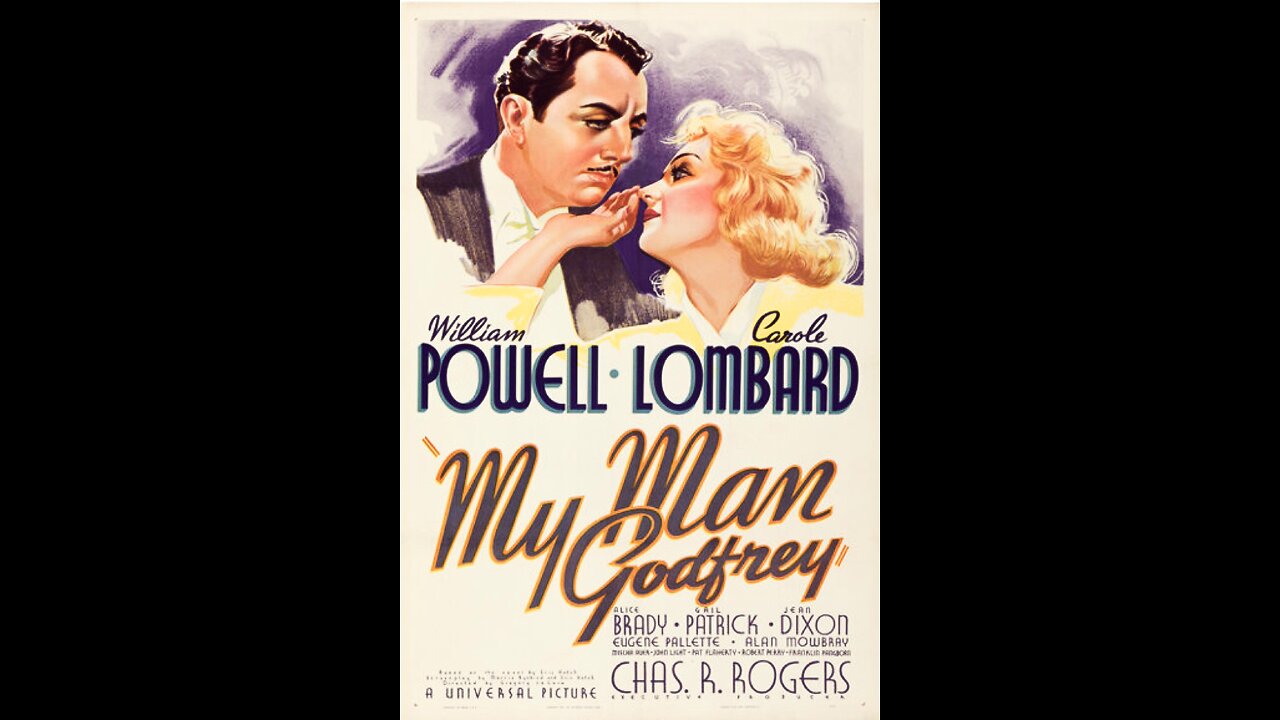Premium Only Content

My Man Godfrey (1936) | Directed by Gregory La Cava
"My Man Godfrey" (1936) is a screwball comedy film directed by Gregory La Cava and features William Powell and Carole Lombard in the lead roles. The film is a delightful and satirical exploration of class differences during the Great Depression.
Directed by Gregory La Cava, "My Man Godfrey" follows the story of Godfrey Park, a "forgotten man" living in a city dump, who is discovered by a whimsical and eccentric socialite, played by Carole Lombard. She hires him as the family butler, leading to a series of comedic events that satirize the frivolity and excesses of the upper class.
The film benefits from the dynamic performances of its lead actors. William Powell brings charm and wit to the character of Godfrey, portraying him as a sophisticated and insightful individual despite his circumstances. Carole Lombard's energetic and eccentric portrayal adds to the film's comedic brilliance.
"My Man Godfrey" is celebrated for its sharp and witty script, blending humor with social commentary. The film cleverly explores the disparity between the privileged elite and those struggling in the midst of economic hardship. The satire is delivered with sophistication, making it both entertaining and thought-provoking.
The supporting cast, including Alice Brady, Eugene Pallette, and Gail Patrick, adds to the comedic ensemble, creating a memorable group of characters. The film's narrative unfolds with rapid-fire dialogue, situational humor, and clever observations about societal norms.
While "My Man Godfrey" is widely regarded as a classic, some critics might argue that its depiction of social issues is more comedic than incisive. Additionally, the exaggerated characters and comedic situations may not resonate with everyone.
In conclusion, "My Man Godfrey" (1936), directed by Gregory La Cava and starring William Powell and Carole Lombard, is a quintessential screwball comedy that blends humor with social satire. The film's witty script, charming performances, and insightful commentary on class distinctions contribute to its enduring status as a classic of the genre.
-
 9:02:15
9:02:15
Dr Disrespect
20 hours ago🔴LIVE - DR DISRESPECT - MARVEL RIVALS - RANKED
374K62 -
 1:00:46
1:00:46
The StoneZONE with Roger Stone
11 hours agoFake News Attack on Tulsi Gabbard! | The StoneZONE w/ Roger Stone
64.9K22 -
 2:24:08
2:24:08
WeAreChange
14 hours agoElon Musk & Donald Trump: The Emergency Halt That Saved Us
89.7K61 -
 1:13:11
1:13:11
Flyover Conservatives
1 day agoWARNING! Is Bitcoin CIA-Controlled? – The Shocking Reality of Digital Assets - Clay Clark | FOC Show
40.8K11 -
 2:00:37
2:00:37
Space Ice
17 hours agoSpace Ice & Redeye Try To Figure Out Seagal's Most Incoherent Movie
161K7 -
 1:00:36
1:00:36
PMG
1 day ago $14.62 earned"Santa Trump is Giving Us Hope - But Will Johnson Stand Strong?"
116K14 -
 54:30
54:30
LFA TV
1 day agoThe German Strongman’s Arrival Is Imminent | Trumpet Daily 12.18.24 7PM EST
85.6K7 -
 2:04:11
2:04:11
Melonie Mac
15 hours agoGo Boom Live Ep 32! Soul Reaver Remastered!
70.6K10 -
 39:11
39:11
Sarah Westall
12 hours agoDigital Slavery and Playing with Fire: Money, Banking, and the Federal Reserve w/ Tom DiLorenzo
86.7K8 -
 1:38:38
1:38:38
2 MIKES LIVE
17 hours ago2 MIKES LIVE #157 ILLEGALS, PROTESTORS AND DRONES!
54.4K2